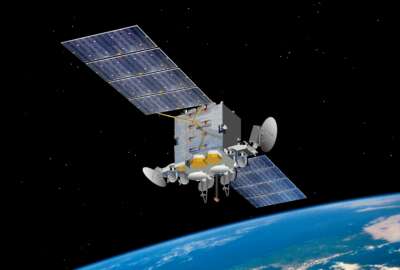The Air Force has a long to-do list when it comes to space operations in the coming years and some of the items require cooperation from partnering nations.
Air Force Secretary Heather Wilson outlined the growing need for her service to put more resources into space from building a common picture of what is happening in space to cultivating international norms and laws ruling the domain.
Wilson’s remarks come as the United States convened the first meeting of its resurrected National Space Council.
“You will see a lot more countries, companies and even individuals in space [in the coming years]. The economics of it have changed,” Wilson said during an Oct. 5 speech at the Center for Strategic and International Studies. “There are some things we need to do and some areas where we are changing what the Defense Department and the Air Force are doing.”
Wilson said first and foremost the Air Force needs to develop a common operating picture of what is going on in space.
The Air Force currently catalogues all of the satellites and debris floating around the earth and keeps an eye on them, but Wilson says that’s not enough.
“If you’re worried about malevolent action in space, you need more than a catalogue. You need near real-time situational awareness of what’s really going on in space around you. Moving toward a more complex picture of what’s happening in space,” Wilson said.
Building off of that is the Air Force’s need for command and control in space. Wilson said the Air Force needs to be able to take action. That includes unfettered access to space and the freedom to operate in it.
Wilson advocated for the Air Force’s common command and control system dubbed the National Space Command Center, which will have an impact on companies selling space equipment to the service.
“In the future as we update satellites that are going to be an open architecture system and we are no longer going to buy satellites with exquisite, kind of science experiment control systems. We can’t do that if we have to decide and act quickly. You have to have a common system for command and control, so if it doesn’t plug into the common system we’re not going to buy it,” Wilson said.
That’s especially important as the military begins to develop offensive and defensive capabilities in space. Wilson said it is imperative the United States is able to protect its assets in space. GPS, for example, is a utility provided by Air Force space operations, which is essential for everything from driving directions to banking and stock transactions.
In addition to working in space, Wilson said the United States needs to make space a policy priority. Wilson wants space to be in joint service conversations and to elevate space conversation. The Air Force created a deputy chief of staff for space to keep space policy talks at a high level.
Congress has taken that message to heart and one upped the Air Force in elevation. The House version of the 2018 defense authorization bill splits the Air Force and creates a separate service called the Space Corps.
The measure, which would also establish a new U.S. Space Command and make the new chief of the Space Corps the eighth member of the Joint Chiefs of Staff, has the support of both Rep. Mac Thornberry (R-Texas), the chairman of the full committee, and its ranking Democrat, Adam Smith (D-Wash.). The bill language was developed by Reps. Mike Rogers (R-Ala.) and Jim Cooper (D-Tenn.), the top Republican and Democrat on the strategic forces subcommittee.
DoD and the Air Force said previously that a Space Corps is not needed at this point, but the House disagrees.
“There’s been nothing shortsighted about this,” Rogers said. “We started working on it vigorously in September, and we’ve had countless meetings with a number of experts who have advised us as to how this should be construed. In fact, this idea for a space corps as one of the solutions to Air Force space came from the Rumsfeld Commission in 2001. GAO has done three studies on this, all of which tell us that you cannot maintain the current organizational construct of the Air Force and solve the acquisition problems and the operational problems that we have. The Air Force is like any other bureaucracy. They don’t want to change.”
Congress is still hammering out the details of the 2018 defense authorization bill and the Senate version of the bill does not have the Space Corps provision in it.
No matter where Congress goes with the Space Corps, Wilson said the United States and its international partners need to establish rules for the use of space.
“How do we establish norms of behavior in what will be a much more congested domain? This will take some time, but it’s not an unknown thing; it’s not completely new,” Wilson said.
She pointed out that there are norms for airplanes in airspace and ships in international waters.
Wilson said space law will include customary laws and negotiations with others on what is acceptable.
The policy discussion doesn’t stop there, however.
Wilson said the United States needs to formulate a policy on what will happen if one of its satellites is attacked in space. The military and Congress have been struggling over similar issues with cyberspace for quite some time.
She added that the United States needs a policy in order to act as a deterrent to attacks.
Copyright
© 2024 Federal News Network. All rights reserved. This website is not intended for users located within the European Economic Area.
